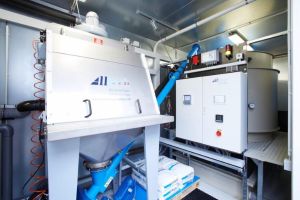Scientists of Karlsruhe Institute of Technology (KIT) have de-veloped a method for the processing of pig liquid manure. With the help of this method, the nutrients contained are separated and converted into a transportable and dosable form. A demonstration plant based on this method was built with part-ners from research and industry. This plant will be opened offi-cially on Thursday, March 06, 2014, 14 hrs, at the Boxberg Edu-cation and Knowledge Center. Representatives of the media are cordially invited.
At the opening ceremony, the Baden-Württemberg Minister of the Environment, Franz Untersteller, and KIT Vice President Professor Alexander Wanner will speak. Then, the Head of the Competence Center for Material Moisture (CMM) of KIT, Dr. Rainer Schuhmann, will present “Nutrient recovery from liquid manure by the P-RoC process”. A visit of the demonstration plant will follow.
The plant is based on the P-RoC method developed by the CMM. P-RoC is the acronym of “Phosphorus Recovery from Waste and Pro-cess Water by Crystallization.” Phosphorus is an essential nutrient for all biological organisms. Worldwide resources are limited. Also other nutrients contained in liquid manure, such as potassium and magnesium, are of high value and may replace mineral fertilizers used in agriculture. Usually, liquid manure is pre-treated prior to application. Treatment takes place in co-fermentation plants to use the energy contained. Upon fermentation, the resulting substrate can be used in agriculture and to close the nutrient cycle.
In refinement regions, however, the area often is not sufficient to use the nutrients contained in the liquid manure in a sensible and envi-ronmentally compatible way. This problem is even aggravated, when fermentation residues from biogas facilities have to be utilized as well. If nutrients are separated from the liquid manure prior to or during the fermentation process by the P-RoC method, the fermen-tation process can be stabilized and the nutrients can be converted into a transportable and dosable form. This ensures regional com-mercialization of the substrate. In addition, a fertilizer is obtained.
Under the project “Nutrient recovery from pig liquid manure”, the team of Dr. Rainer Schuhmann developed the method to practical maturity. The Education and Knowledge Center for Pig Breeding, Boxberg, provided the infrastructure. There, the new demonstration plant is integrated into the operation of a co-fermentation plant. The engineering office Roth & Partner was responsible for planning the plant, Alltech Dosieranlagen GmbH was in charge of construction. The University of Hohenheim confirmed that the secondary phosphate generated has a fertilizing effect.
The project had a duration of two years and has now been completed by opening the demonstration plant. The project was financed from the European Regional Development Fund (ERDF) by the European Union and by the State of Baden-Württemberg from funds of the Ministry of the Environment, Climate Protection and the Energy Sector. The funds total about EUR 650,000.
Ministry of Rural Affairs and Consumer Protection of Baden-Württemberg, www.rwb-efre.baden-wuerttemberg.de.

